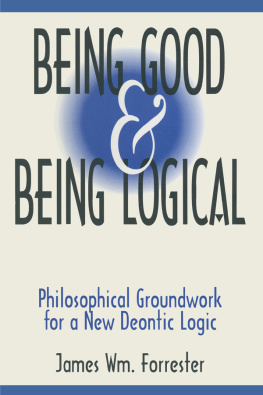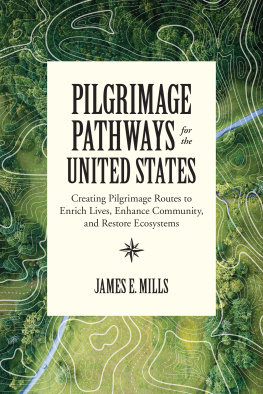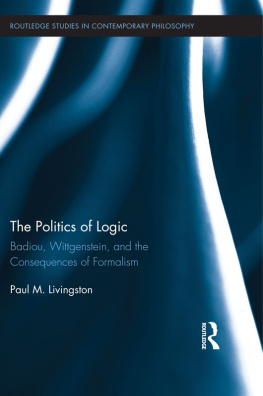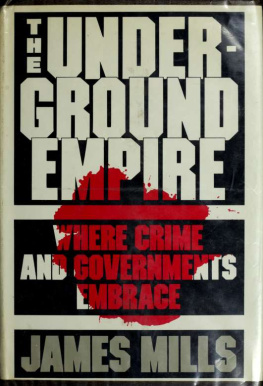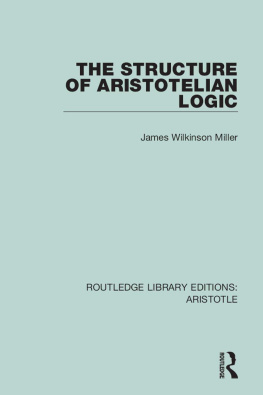
James Mills Utilitarian Logic and Politics
James Mills (17731836) role in the development of utilitarian thought in the nineteenth century has been overshadowed both by John Stuart Mill (18061873) and by Jeremy Bentham (17481832). Of the three, the elder Mill is considered to be the least original and with the least important, if any, contributions to utilitarian theory. True as this statement may be, even those who have tried to challenge some of its aspects take the common portrayal of Mill the rationalist, the maker of syllogisms, the geometrician as given. This book does not. Studying James Mills background has surprising results with reference to influences outside the Benthamite tradition as well as unexpected implications for his contributions to debates of his time. The book focuses on his political ideas, the ways in which he communicated them and the ways in which he formed them in an attempt to reveal a portrait of Mill unencumbered from the legacy of Thomas Babington Macaulays (18001859) brilliant essay Utilitarian Logic and Politics.
Antis Loizides is Lecturer at the Department of Social and Political Sciences, University of Cyprus.
Routledge Studies in Modern British History
British Politics, Society and Empire, 18521945
Essays in Honour of Trevor O. Lloyd
David W. Gutzke
Deprivation, State Interventions and Urban Communities in Britain, 196879
Peter Shapely
Private Secretaries to the Prime Minister
Foreign Affairs from Churchill to Thatcher
Edited by Andrew Holt and Warren Dockter
Liberal Reform and Industrial Relations: J.H. Whitley (18661935), Halifax Radical and Speaker of the House of Commons
Edited by John A. Hargreaves, Keith Laybourn and Richard Toye
Neoliberal Thought and Thatcherism
A Transition from Here to There?
Robert Ledger
English Gentlemen and World Soccer
Corinthians, Amateurism and the Global Game
Chris Bolsmann and Dilwyn Porter
Milton Keynes in British Culture
Imagining England
Lauren Pik
Winston Churchill
At War and Thinking of War before 1939
Edited by B.J.C. McKercher and Antoine Capet
James Mills Utilitarian Logic and Politics
Antis Loizides
For more information about this series, please visit: https://www.routledge.com/history/series/RSMBH
First published 2019
by Routledge
2 Park Square, Milton Park, Abingdon, Oxon OX14 4RN
and by Routledge
52 Vanderbilt Avenue, New York, NY 10017
Routledge is an imprint of the Taylor & Francis Group, an informa business
2019 Antis Loizides
The right of Antis Loizides to be identified as author of this work has been asserted by him in accordance with sections 77 and 78 of the Copyright, Designs and Patents Act 1988.
All rights reserved. No part of this book may be reprinted or reproduced or utilised in any form or by any electronic, mechanical, or other means, now known or hereafter invented, including photocopying and recording, or in any information storage or retrieval system, without permission in writing from the publishers.
Trademark notice: Product or corporate names may be trademarks or registered trademarks, and are used only for identification and explanation without intent to infringe.
British Library Cataloguing in Publication Data
A catalogue record for this book is available from the British Library
Library of Congress Cataloging-in-Publication Data
A catalog record has been requested for this book
ISBN: 978-1-138-20488-1 (hbk)
ISBN: 978-0-429-05936-0 (ebk)
To Marina & Aliki
A generous grant by the A.G. Leventis Foundation has been instrumental in the completion of this book; I am thankful to the Research Committee of the University of Cyprus (UCY) for awarding the grant, allowing me to visit libraries and attend conferences. I have also been lucky teaching for the last six years at the Department of Social and Political Sciences at the University of Cyprus; the passion of students and teachers here for the history of political thought and political theory has proved to be quite the motivation.
Its always exciting interacting with people who just love books. I owe thus special thanks to the staff of UCY Library, the Library of Geneva, the British Library, Senate House Library, London Library, the Library of the University of Sussex, LSE Library, QMUL Library and UCL Library. The librarians at the University of Aberdeen, University of Edinburgh and the National Library of Scotland have been especially accommodating during my visits. Additionally, without an online world of information, I truly would have been at a loss; thus I must acknowledge several online depositories: www.Archive.org, Google Books, HathiTrusts Digital Library, Electronic Enlightenment, ARTFL Encyclopdie Project, JISC, Online Library of Liberty, Perseus Digital Library and the various repositories of ProQuest.
It must be obvious from the last remark that, as I am based in Cyprus, I depended on the kindness of strangers, either because, in their institutional capacity, they could provide access to scans of material or, as specialists, they could forward their work to me. I have enjoyed exchanging emails with Neil De Marchi and David McInerney, who were keen to send me their work on James Mill. Similarly, I wish to thank Callum Barrell for his support, his valuable thoughts on the elder Mill and his willingness to share his work, while reading and commenting upon my own. Needless to say, I have learned a lot from all three.
Georgios Varouxakis was the one who encouraged me to write a book on James Mill. Insightful, generous and helpful, as always, Georgios read and commented upon the first draft. I can never thank him enough, not just for greatly improving this book with his inputthough I bear sole responsibility for any errors and defects that might remain but also for his constant support throughout the years. Terence Ball, Kyriakos Demetriou, and Frederick Rosen have each in their way helped me more than they could ever realize. Both their conversation (in person and/or via email) and their works have been sources of stimulus, inspiration, and emulation. Hopefully they have some idea how grateful I am. Richard Bourke, Janet Coleman, Stuart Jones, Sofia Kanaouti, Duncan Kelly, Gregoris Molivas, Alan Ryan, Philip Schofield and Richard Whatmore have also been supportive in more ways than one. I would also like to thank Robert Langham for believing in this project, convincing me that Routledge would be a good home for it. I am also indebted to Tom Bedford for his hard work in copyediting this book. I should also note that without the late Robert Fenns indefatigable exertions in identifying James Mills numerous articles and in transcribing his manuscripts, I would have never thought of engaging with the elder Mills thought. Its a great loss to Millian studies that his work remained unfinished.
I owe a special thanks to close friends and colleagues for their tireless cheering on a daily basis: Demetris Lazarou, Anastasia Yiangou, Constantinos Georgiou, Antigoni Heracleidou, Yiannis Trimithiotis, Demetris Trimithiotis, Sofia Stavrou, Costas Melakopides, Stamatoula Panagakou, Marios Nikolaou, Chris Constantinou, Stella Michaelidou and, last but not least, Charis Georgiou. It goes without saying, but sometimes its just better to say it, that my family has also played an important part in the completion of this book, and not just in understanding why I missed so many Sunday lunches or in making sure that my share of the feast would make its way to me nonetheless! Similarly, George Loizides and Sarah Cahill had to put up with me, and put me up, practically every time I flew into London; I thank them with all my heart.



